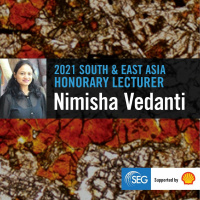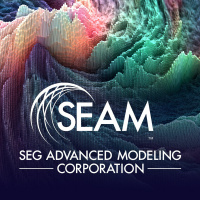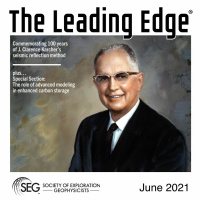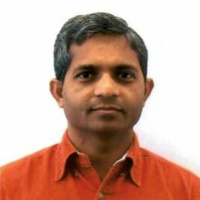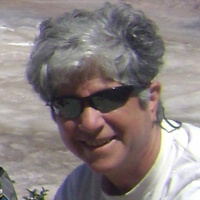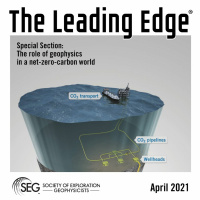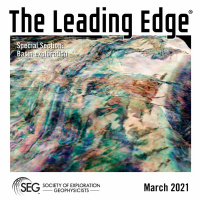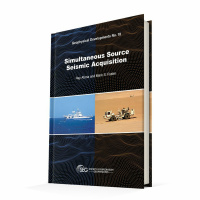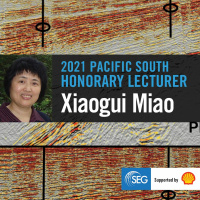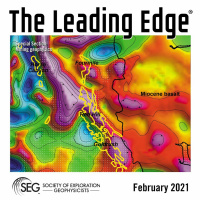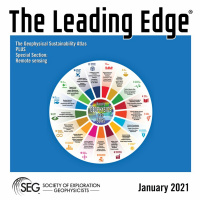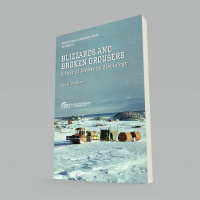Synopsis
In-depth conversations in applied geophysics from the Society of Exploration Geophysicists (SEG). With new episodes monthly, Seismic Soundoff highlights industry leaders; emerging research and technology; the social contributions of geoscience; and the latest geophysical, environmental, and engineering applications.
Episodes
-
121: Solving the seismic wave attenuation problem
15/07/2021 Duration: 26minNimisha Vedanti highlights her Honorary Lecture on understanding seismic wave attenuation mechanisms. Nimisha explains how she discovered the problem of seismic attenuation, why seismic attenuation is one of the least understood physical mechanisms, practical takeaways from her lecture, and highlights from two real-world case studies. Visit https://seg.org/podcast for the complete show notes. BIOGRAPHY Nimisha Vedanti received M.Sc. (Tech) in Exploration Geophysics from Banaras Hindu University, Varanasi, India, and Ph.D. (2007) from Osmania University, Hyderabad, India, while working as a Junior Scientist at CSIR-National Geophysical Research Institute, Hyderabad, India. She held a postdoctoral position at the University of Texas at Austin, USA (2007-2008), and worked as CSIR-Raman Research Fellow at the Department of Geoscience, University of Calgary, Canada in 2016. She has been a visiting scientist at the Norwegian University of Science and Technology (NTNU) and SINTEF Petroleum Research, Trondheim, No
-
120: Creating a trillion-dollar business
08/07/2021 Duration: 20minJosef Paffenholz discusses the next trillion-dollar business and how SEG's SEAM project could play an essential role in its creation. The SEG Advanced Modeling (SEAM) Corporation initiative is a collaborative industrial research effort that has created and continues to create large-scale, leading-edge geophysical numerical simulations. The initiative has advanced “the science of geophysics through SEAM’s open collaborative and cooperative research model involving industry, government, and academia.” In this exciting conversation, Josef highlights why the oil and gas sector represents the best source to tackle industrial-scale carbon storage, why he believes it's dangerous to link carbon storage to the oil price, and how advanced simulations like SEAM could ignite this trillion-dollar business. Josef Paffenholz is a retired research geophysicist and currently works as a consultant for SEAM to prepare a possible carbon sequestration project. Visit https://seg.org/podcast for the complete show notes. SPONSO
-
119: Why the energy transition from coal to oil matters today
01/07/2021 Duration: 27minHistorian Brian Frehner discusses the energy transition from coal to oil and the historical importance of J. Clarence Karcher. June 2021 marks the 100th anniversary of field tests confirming that J. Clarence Karcher's seismic reflection technique could detect and map structures capable of trapping oil. In this future-focused conversation, Brian discusses why Karcher left the oil business after his major breakthrough, the impact business had on the development of the oil industry, the creation of geophysics as a discipline, and the lessons learned for future energy transitions. The transition to oil may seem obvious now, but it was not inevitable. By studying the past energy transition from coal to oil, scientists and the public can better understand how transitions do and do not occur and better prepare for future transitions. Visit https://seg.org/podcast for the complete show notes. BIOGRAPHY Brian Frehner is an Associate Professor of History at the College of Arts and Sciences at the University of Miss
-
118: The secret to maximizing your professional career
17/06/2021 Duration: 18minDr. Dhananjay (DJ) Kumar discusses his course, the value of membership at SEG, and the activities essential for the professional development of geophysicists. This conversation covers a wide range of topics from synthetic seismograms construction to how to get the most of your membership at SEG. DJ has taken advantage of his activities throughout his career and is excited to share his lessons learned with this audience. Visit https://seg.org/podcast for the complete show notes. BIOGRAPHY Dhananjay Kumar received a B.S. (1998) in geological sciences and an M.S (2000) in exploration geophysics from the Indian Institute of Technology Kharagpur and a Ph.D. (2005) in geophysics from the University of Texas at Austin. Since 2012, he has been working as a geophysicist at BP Upstream Technology in Houston. Earlier, he worked one year for Reliance in Mumbai and seven years for Chevron in San Ramon and Houston. His research interests include reservoir properties predictions from seismic, 4D seismic, shale gas, and g
-
117: The next 20 years for geophysics and the industry
10/06/2021 Duration: 19minDr. Ali Tura discusses his upcoming Distinguished Lecture, "Recent advances in seismic reservoir characterization and monitoring." Ali provides an overview of the three advances he highlights in his lecture and shares a few that didn't make the list. In addition, he explains why carbon sequestration is the most important issue facing the industry and why geophysics is well-positioned to support sequestration for enhanced oil recovery. This conversation is a great peek into the next 20 years for geophysics and the industry. Visit https://seg.org/podcast for the complete show notes. BIOGRAPHY Ali Tura is a professor of Geophysics and Co-director of the Reservoir Characterization Project at Colorado School of Mines. His expertise is in the areas of petroleum systems, reservoir characterization and monitoring, seismic methods, CO2 and sequestration, fiber optics technology, and data analytics. He is also chief scientist at Tulip Geosciences, a geosciences consulting and training company. Before this, he was ge
-
116: Addressing grand challenges with geophysics
03/06/2021 Duration: 23minDavid Lumley highlights two of SEG's Strategic Pillars and the geophysicists' role in supporting space exploration and the medical field. In this illuminating conversation, David outlines how geophysics supports the grand challenges of our world, how geophysics could quantitatively contribute to the medical field, how universities and companies could encourage greater collaboration, and a valuable tip to become a better innovator. This conversation will help jump-start your knowledge on how geophysics can keep innovating and improving this world and beyond. Visit https://seg.org/podcast for the complete show notes. BIOGRAPHY David Lumley is noted for his pioneering work in the area of 4D seismic monitoring. He is currently the Cecil and Ida Green Endowed Chair in Geophysics and the director of Seismic Imaging and Inversion Lab at the University of Texas at Dallas (UTD). His expertise is wave-theoretic Seismology, especially 3D imaging, 4D time-lapse monitoring, and Inversion estimation of physical properti
-
115: How full-waveform inversion counteracts complex overburdens
20/05/2021 Duration: 21minDenes Vigh discusses the current developments and future growth areas for full-waveform inversion. In this informative conversation, Denes shares why it's necessary for full-waveform inversion (FWI) to utilize the full acquired wavefield, how ocean-bottom node surveys have impacted FWI, the next frontier for FWI, and his favorite feature of utilizing FWI in his work. Denes Vigh is the manager of the Full-Waveform Inversion Center of Excellence at Schlumberger. Check out the May 2021 The Leading Edge to learn more about seismic imaging below complex overburdens. Visit https://seg.org/podcast for the complete show notes. SPONSOR This episode is sponsored by TGS. TGS offers a wide range of energy data and insights to meet the industry where it’s at and where it’s headed. TGS provides scientific data and intelligence to companies active in the energy sector. In addition to a global, extensive and diverse energy data library, TGS offers specialized services such as advanced processing and analytics alongside
-
114: The future of learning and nonseismic
13/05/2021 Duration: 15minDr. Michal Ruder discusses continuing education and her new course, Gravity and Magnetics for Explorationists. In this forward-thinking conversation, Michal shares the most important thing for explorationists to focus on right now, what she would say to the CEO of an oil and gas company, the future of GIS data for exploration, and the importance of nonseismic work in geophysics. As the world transitions to more forms of hybrid learning, this episode will help provide clarity and direction in your continuing education. Visit https://seg.org/podcast for the complete show notes BIOGRAPHY Michal Ruder received her AB cum laude from Bowdoin College with a joint major in geology and physics in 1979. In 1986, she was awarded a Ph.D. in geophysics from The Pennsylvania State University. Her work experience spans government, academic, and industrial research and exploration laboratories. While at NASA during graduate school, she analyzed satellite gravity and magnetic data from the Seasat and Magsat missions. Micha
-
113: Solutions to decarbonize the future (April 2021 TLE)
06/05/2021 Duration: 20minIn this episode, host Andrew Geary speaks with Margariete Malenda and Tiziana Vanorio on utilizing rock physics and geophysics to decarbonize the future. In this conversation, Margariete and Tiziana highlight the role of rock physics within geophysics, short- and long-term solutions to decarbonization, common misperceptions about decarbonization among the public and scientific community, how to increase geothermal energy, and much more. This is an informative and scientific conversation on modern and cutting-edge solutions to address the earth's current needs. Visit https://seg.org/podcast for the complete show notes and links to read the articles in April's The Leading Edge. BIOGRAPHIES Margariete Malenda is a doctoral student at Stanford University. Her current research looks at the impacts of rock-fluid interactions on elastic, mechanical, and transport on earth-derived materials. She received an M.Sc. in Geochemistry from the Colorado School of Mines and a B.Sc. in Geology from the Kutztown University
-
112: International partnership for volcano early warning – A GWB story
15/04/2021 Duration: 16minIn this special episode, Seismic Soundoff features SEG’s humanitarian program, Geoscientists Without Borders (GWB). We highlight Silvio De Angelis’s project to create an international partnership to develop volcano monitoring capacities in Guatemala. In Guatemala, volcanic hazard is high with over 1.3 million people living within six miles of an erupting volcano, and over 7 million people living within 19 miles. Silvio's goal was to help build an effective early warning and volcano monitoring framework in Guatemala and improve the risk mitigation policies in the region. This episode will inspire listeners to the usefulness of applied geophysics and the unique funding opportunities through GWB. Visit https://seg.org/podcast for links to learn more about GWB, the Geophysical Sustainability Atlas, and SEG's Strategic Pillars. BIOGRAPHY Silvio De Angelis is a Senior Lecturer in Geophysics at the University of Liverpool. De Angelis is a geophysicist with a background in monitoring, interpretation, and modeling
-
111: SEG's position on climate change
08/04/2021 Duration: 22minIn this episode, host Andrew Geary speaks with John Bradford on SEG's recent statement on climate change. John led the Climate Change Task Force charged with creating a statement for SEG. The SEG Board adopted the position statement in a unanimous vote during its January 2021 meeting. In this conversation, John provides an overview of SEG's position on climate change, the role geophysics plays in achieving a net-zero-carbon future, and solutions available to address the current climate change. This is an important conversation on the future of the Earth and geophysicists' role to address climate change. Visit https://seg.org/podcast for the complete show notes and the link to SEG's statement. ABOUT THE SEG'S CLIMATE CHANGE TASK FORCE The statement was developed by a Climate Change Task Force led by John Bradford, an SEG past president, along with David Lumley and Maria Angela Capello, current SEG Board of Directors members. Bradford is Vice President for Global Initiatives and Professor of Geophysics at th
-
110: Leveraging real-world learning for students and companies
01/04/2021 Duration: 17minIn this episode, host Andrew Geary speaks with Mohamed Ahmed on geophysical test sites. In this conversation, Mohamed highlights the importance of field exercises, why geophysical test sites can act as a competitive advantage, and the many ways test sites can be used by students and companies (for free). This conversation showcases the importance of experiential learning in novel ways. Visit https://seg.org/podcast for the complete show notes and links to read the articles in March's The Leading Edge. Editor's Note: The construction of the geophysical test site at Texas A&M University-Corpus Christi was supported by the university, as well as the Corpus Christi Geological Society. BIOGRAPHY Dr. Mohamed Ahmed is an Assistant Professor of Geophysics at Texas A&M University-Corpus Christi. His work focuses on applying integrated (geophysics, remote sensing, hydrogeology, modeling, GIS) approaches to investigate a wide range of complex problems. His current research activities involve the use of gravity data
-
109: The truth and value of simultaneous source technology
18/03/2021 Duration: 23minIn this episode, host Andrew Geary speaks with Ray Abma on his new book, Simultaneous Source Seismic Acquisition. This book introduces simultaneous source technology and helps those who practice it succeed. This work is written through the lens of decades of experience and allows readers to understand the development of independent simultaneous sourcing. In this widely relevant and persuasive interview, Ray shares why you should acquire seismic data using simultaneous source acquisition, the close relationship between data acquisition and data processing, how marine seismic interference may be a thing of the past, and tips on convincing management and technical staff to use this new technology. This conversation applies to a wide variety of disciplines and jobs - make sure to listen! Visit https://seg.org/podcast for the complete show notes and links to purchase the book. BIOGRAPHY Ray Abma graduated from Stanford University in 1995 with a Ph.D. in geophysics after working in the Stanford Exploration Pro
-
108: Seismic processing - Begin with the end in mind
11/03/2021 Duration: 18minIn this episode, host Andrew Geary speaks with Stephen J. Hill on his new book, Illustrated Seismic Processing, Volume 2: Preimaging. Along with Steve's co-author Andreas Rüger, this second volume of Illustrated Seismic Processing provides a foundation for understanding the vigorous, relevant, and fascinating field of seismic processing, addressing that portion that precedes migration. Written for the non-expert, this second volume of the two-volume introductory text reveals the limitations and potential pitfalls of seismic data, explains seismic processing operations as a series of solutions to problems, and demonstrates the dependence of a final interpretable seismic volume on its many seismic processing decisions. In this engaging interview, Steve shares why they decided to present the seismic processing topics in reverse order, tips for seismic interpreters and acquisition specialists that work alongside seismic processing geophysicists, and why seismic processing is both an art and a science. And also
-
107: The low-cost/high-reward for using multi-component imaging
04/03/2021 Duration: 19minDr. Xiaogui Miao highlights her SEG Honorary Lecture 2021 talk, "From multi-component imaging to ocean bottom seismic technology - challenges or opportunities?". In this intriguing conversation, Xiaogui makes a convincing argument that utilizing multi-component imaging is a low-cost and low-effort option for companies to better discover oil and gas. She also discusses how utilizing multi-component technology is like moving from black and white images to color and how recent advancements in converted-wave imaging have addressed long-standing challenges. This episode will challenge the status quo and help the geophysicist make a persuasive case to management to use multi-component imaging. Visit https://seg.org/podcast for the complete show notes and links for Xiaogui's free lecture. BIOGRAPHY Xiaogui Miao, Ph.D. quested after multi-component imaging and processing technologies for more than 20 years. Dr. Xiaogui Miao has the expertise and possessed extensive experience in land 3D3C and Ocean Bottom Sensor (O
-
106: How geophysics can help provide freshwater to the world
18/02/2021 Duration: 24minIn this episode, host Andrew Geary speaks with Kerry Key and Chloe Gustafson on their massive freshwater discovery off the East Coast of the United States. According to the United Nations, 60% of the world's population lives in places with high water stress, meaning that more water is being withdrawn than is currently available. In this crucial conversation, Kerry and Chloe discuss how they used existing geophysical techniques in a new way to discover freshwater off the United States' Atlantic Coast, the equivalent amount that would fill 1.1 billion Olympic-sized swimming pools. Kerry and Chloe also share how scientists in other parts of the world could utilize this discovery to find their own sources of freshwater and what the future could look like if electromagnetic methods get widely adopted for seeking freshwater. This is a fun and exciting conversation on how geophysics can help the world. You'll want to share this one with your family and friends! Visit https://seg.org/podcast for the links to the r
-
105: Why now is the right time for mining geophysics
11/02/2021 Duration: 21minIn this episode, host Andrew Geary speaks with Jean Legault on mining geophysics, the featured special section in February's The Leading Edge. In this conversation, Jean highlights the similarities and differences of mining geophysics with seismic, why now is a great time to be a mining geophysicist, and the growth of machine learning in the field. There's something in this interview for everyone. Visit https://seg.org/podcast for the complete show notes and links to this month's special section on mining geophysics. BIOGRAPHY Jean M. Legault is a 30-year career exploration geophysicist. He obtained his Bachelor's degree in applied science (geophysics) at Queen's University at Kingston, ON, and his Master's degree in applied science (geophysics) at École Polytechnique of University of Montreal, QC. He is an experienced geophysicist in both the ground and airborne geophysics sectors since 1985. He is chief geophysicist at Geotech Ltd. (Aurora), a worldwide airborne geophysical service provider, where he is
-
104: Maximizing the value of mature fields
04/02/2021 Duration: 23minDr. Adriana Citlali Ramírez highlights her SEG Honorary Lecture Europe 2021 talk, "Seismic technology in northern European waters and the prevalence of multiples." In this compelling conversation, Adriana showcases the value of exploring and developing mature oil and gas fields, the value of moving first on new technology, and offers great advice to succeed in the industry. This episode will convince you to sign up for her free lecture! Visit https://seg.org/podcast for the complete show notes and links for Adriana's free lecture. BIOGRAPHY Adriana Citlali Ramírez is a Mexican citizen who has a Ph.D. in physics from the University of Houston’s Mission-Oriented Seismic Research Program. During her graduate studies, Adriana did internships with Shell, Statoil (now Equinor), ConocoPhillips, and BP. After graduation, she worked in R&D at WesternGeco in the United States, and later at PGS in the UK. In 2012, Adriana joined Equinor’s Research and Technology Exploration unit in Norway, where she led the R&D work r
-
103: One plan to jumpstart the geophysics field
21/01/2021 Duration: 27minIn this episode, host Andrew Geary speaks with Emer Caslin on the Geophysical Sustainability Atlas, the featured article in January's The Leading Edge. To help provide a clear value proposition to inspire new generations of scientists to pursue careers in geophysics and motivate current geophysicists to expand their activities and utilize their skills, a small group worked on mapping geophysical applications and practices to the 17 Sustainable Development Goals (SDGs) adopted by the United Nations in 2015. This Geophysical Sustainability Atlas was developed to illustrate how geophysics contributes to each of the SDGs and to provide examples of specific applications and collaboration strategies. In this conversation, Emer provides an overview of the Atlas, how individuals and companies can utilize it to create meaningful impact, how professional societies can contribute to the SDGs, and why incorporating the SDGs into strategic planning could support the next generation of geophysicists. This is an impor
-
102: Geophysics at the Ends of the Earth
14/01/2021 Duration: 20minIn this episode, host Andrew Geary speaks with Les Denham on his new book, Blizzards and Broken Grousers: A Year of Antarctic Glaciology. Detailing one year of Antarctic field operations in 1970–71 acquiring ice thickness data with radar, gravity, and magnetometer measurements, this book depicts the pioneering spirit of geophysics in the time when field operations spanned the globe. Moreover, the data collected now underpin models of ice behavior used to assess climate change. Les offers a rare personal account of a scientific journey. This book (https://seg.org/shop/products/detail/237626086) provides a detailed account of the author’s Antarctic experience in a time before GPS, satellite communications, internet, and even links to Antarctica by air. In this conversation, Les shares the inspiration behind the book, his most memorable field trip in Antarctica, and how the technology he utilized in 1970 can help the geophysicists of today. Visit https://seg.org/podcast for the complete show notes and links t

